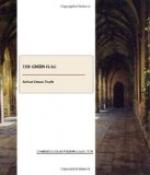“Hang it, I’m only twenty-three!” said Montgomery to himself, and read on more cheerfully.
Having in his youth shown a surprising aptitude for the game, he fought his way up among his comrades, until he became the recognised champion of the district and won the proud title which he still holds. Ambitious of a more than local fame, he secured a patron, and fought his first fight against Jack Barton, of Birmingham, in May 1880, at the old Loiterers’ Club. Craggs, who fought at ten stone-two at the time, had the better of fifteen rattling rounds, and gained an award on points against the Midlander. Having disposed of James Dunn, of Rotherhithe, Cameron, of Glasgow, and a youth named Fernie, he was thought so highly of by the fancy that he was matched against Ernest Willox, at that time middle-weight champion of the North of England, and defeated him in a hard-fought battle, knocking him out in the tenth round after a punishing contest. At this period it looked as if the very highest honours of the ring were within the reach of the young Yorkshireman, but he was laid upon the shelf by a most unfortunate accident. The kick of a horse broke his thigh, and for a year he was compelled to rest himself. When he returned to his work the fracture had set badly, and his activity was much impaired. It was owing to this that he was defeated in seven rounds by Willox, the man whom he had previously beaten, and afterwards by James Shaw, of London, though the latter acknowledged that he had found the toughest customer of his career. Undismayed by his reverses, the Master adapted the style of his fighting to his physical disabilities and resumed his career of victory—defeating Norton (the black), Hobby Wilson, and Levi Cohen, the latter a heavy-weight. Conceding two stone, he fought a draw with the famous Billy McQuire, and afterwards, for a purse of fifty pounds, he defeated Sam Hare at the Pelican Club, London. In 1891 a decision was given against him upon a foul when fighting a winning fight against Jim Taylor, the Australian middle weight, and so mortified was he by the decision, that he withdrew from the ring. Since then he has hardly fought at all save to accommodate any local aspirant who may wish to learn the difference between a bar-room scramble and a scientific contest. The latest of these ambitious souls comes from the Wilson coal-pits, which have undertaken to put up a stake of 100 pounds and back their local champion. There are various rumours afloat as to who their representative is to be, the name of Ted Barton being freely mentioned; but the betting, which is seven to one on the Master against any untried man, is a fair reflection of the feeling of the community.
Montgomery read it over twice, and it left him with a very serious face. No light matter this which he had undertaken; no battle with a rough-and-tumble fighter who presumed upon a local reputation. The man’s record showed that he was first-class—or




